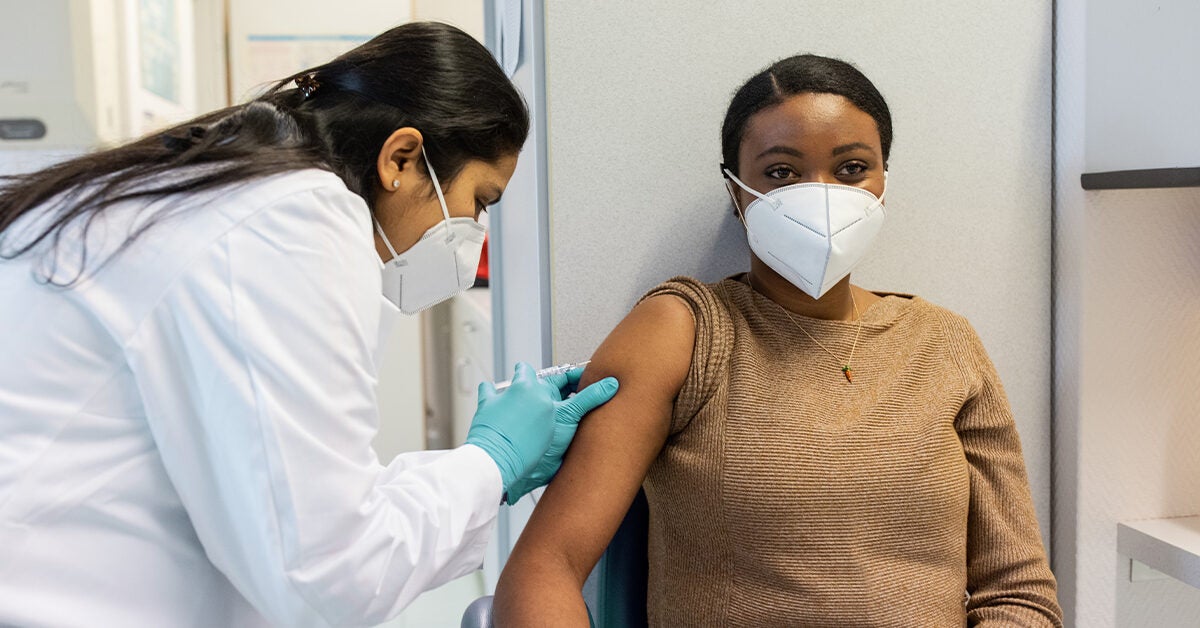Can the COVID-19 Vaccine Cause Facial Paralysis? - Healthline

You may have heard that some people have experienced facial paralysis after getting the COVID-19 vaccine. While facial paralysis has been documented following COVID-19 vaccination, it's an extremely rare occurrence.
In fact,
Keep reading as we explore what we know so far about facial paralysis and the COVID-19 vaccine.
Facial paralysis is when you lose the ability to move the muscles in your face. It can affect either one side or both sides of your face.
On a basic level, facial paralysis happens when nerve activity through the facial nerves is disrupted in some way. Inflammation, injury, or nerve compression often play a role.
Some examples of the potential causes of facial paralysis include:
Bell's palsy is the most common cause of facial paralysis, making up about
Facial paralysis, specifically Bell's palsy, has been reported following COVID-19 vaccination. The symptoms of Bell's palsy include:
- sudden facial weakness or paralysis, typically affecting only one side of the face
- drooping of the eye and mouth on the affected side
- inability to blink or make facial expressions
- changes in tear production
- trouble with eating and drinking
- headache
- drooling
- altered sense of taste
- sensitivity to loud noises
Bell's palsy is a temporary condition. Typically, symptoms begin to gradually improve a few weeks after they begin. Most people completely recover the function of their facial muscles
Bell's palsy has been mainly reported following vaccination with mRNA COVID-19 vaccines. These are the vaccines produced by Pfizer-BioNTech and Moderna. Let's look at the research on this topic.
Both of the large-scale clinical trials for the Pfizer-BioNTech and Moderna vaccines reported instances of Bell's palsy:
- Pfizer-BioNTech. Of 43,252 trial participants,
4 people in the vaccine group experienced Bell's palsy, compared with no people in the control group. - Moderna. Of 30,350 trial participants,
3 people in the vaccine group experienced Bell's palsy, compared with 1 person in the control group.
Both manufacturers noted that there was no reason to conclude that vaccination directly caused Bell's palsy. However, they also recommended further surveillance for the condition as the vaccine was given to larger populations.
Later studies into mRNA vaccines and Bell's palsy
While the clinical trials of the mRNA vaccines reported a small number of instances of Bell's palsy, later studies haven't found an increased risk of Bell's palsy after vaccination. Let's see what some of them say.
A
A small
After factoring in recent vaccination with the Pfizer-BioNTech vaccine, no association between vaccination and the risk of Bell's palsy was found. In fact, the number of admissions for Bell's palsy during the study period was similar to pre-pandemic levels.
Another
SummaryWhile clinical trials reported a very small number of instances of Bell's palsy, later studies have found no association between mRNA COVID-19 vaccines and an increased risk of Bell's palsy. In fact, according to recent research, the risk of Bell's palsy seems to be higher for those who develop COVID-19 versus those who get the mRNA vaccine.
It's important to stress that facial paralysis after getting a COVID-19 vaccine is exceedingly rare. The most common side effects include things such as pain at the site of injection, fever, and muscle aches and pains.
While Bell's palsy can affect anyone, some factors can put you at an increased risk of Bell's palsy, according to the
Regardless of whether or not you have risk factors, if you're worried about Bell's palsy and vaccination, talk with a doctor or healthcare professional about your concerns. They can help answer any questions you may have.
Facial paralysis has been reported only very rarely after vaccination with mRNA COVID-19 vaccines. Additionally, researchers have found no association between these vaccines and an increased risk of facial paralysis.
Vaccination is a vital tool in preventing serious illness and death from a variety of infectious diseases, including COVID-19. If you ever have questions or concerns about any vaccine, be sure to discuss them with a doctor.



Comments
Post a Comment